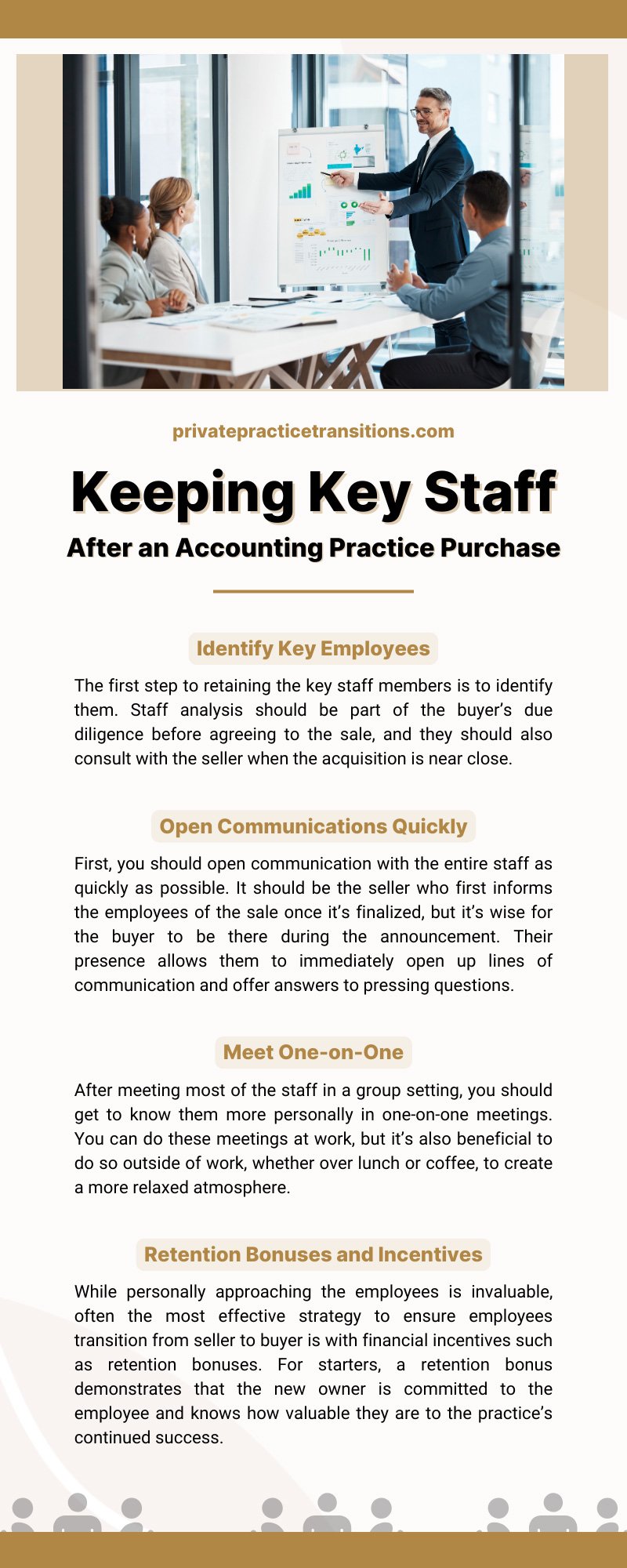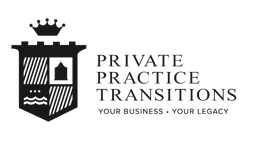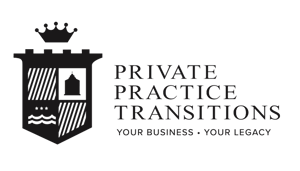The staff is one of the most important variables in the transition of an accounting practice, or any private practice, from previous to new ownership. Below, we’ll explore the benefits of staff retention and offer strategies for keeping key staff after an accounting practice purchase.
The Benefits of Staff Retention After Acquisition
While starting fresh with your new private practice may be tempting, retaining much of the key staff from the prior management offers many benefits.
Organizational Cohesion
A major benefit to staff retention after an acquisition or merger is that it makes for a more cohesive and efficient organization. The transition from seller to buyer for a private accounting practice can be hectic and chaotic, but it doesn’t have to be if much of the same staff stays.
Employee retention is critical to organizational consistency and will help smooth the transition process for the new ownership. And, if staff see that their peers and supervisors are sticking around with the new management, they’re more likely to feel comfortable doing the same.
Client Relationships
One of the most important elements of success for an accounting practice is client retention. Building solid and dependent relationships with clients can take years and ensures your practice has a revenue stream it can rely on.
However, if staff leave after an ownership change, they could take their clients with them, meaning you’ll lose a significant chunk of the revenue at a critical time. If you want your practice to start on the right foot, ensuring the biggest and most reliable clients stay is a key factor. If the employees those clients have a relationship with are still there, they’re more likely to stick around too.
Employee Morale
It’s also a boost to employee morale if the majority of their co-workers stay during the transition. If many key employees leave because they don’t believe in the organization’s future, that uncertainty could spread and cause many to feel uncertain about the practice and its new ownership.
But, if most important staff members stay on, their presence is an endorsement of the new management. Employee morale is a fickle thing, and it can affect everything from customer service to staff efficiency, so it’s always best to keep morale as high as possible.
Employee Turnover Costs
Keeping staff is also a major cost-saving measure for the new ownership. Hiring and training a new employee is always more expensive than retaining an existing one, and the onboarding process will naturally drag down efficiency and productivity.
New owners will have to invest their time and resources into recruiting, hiring, and training new staff instead of other aspects of the business, such as attracting new clients. Investing in retaining older staff instead of hiring new staff for a private practice makes practical and financial sense.
Strategies for Retaining Key Staff
Clearly, it’s in the new owner’s best interests to keep key staff after an accounting practice purchase, but how should new owners approach retention? While every organization and employee is different, the best retention strategies typically combine a personal approach and financial incentives.
Identify Key Employees
The first step to retaining the key staff members is to identify them. Staff analysis should be part of the buyer’s due diligence before agreeing to the purchase, and they should also consult with the seller when the acquisition is nearing closing.
Which employees does the seller consider invaluable, and what do they believe would personally motivate these employees to stay on after the transition? Are there employees who have been angling for a promotion or could do more in a different, more prominent role at the practice? Once you know the key members to engage with first, you can speak with them about staying on.
Open Communications Quickly
First, you should open communication with the entire staff as quickly as possible. It should be the seller who first informs the employees of the sale once it’s finalized, but it’s wise for the buyer to be there during the announcement. Their presence allows them to immediately open up lines of communication and offer answers to pressing questions.
Many employees will naturally have anxiety about this drastic change, so you should do your best to alleviate those concerns and show you’re motivated to retain key staff. If possible, assure existing staff members that their positions are secure post-sale and that the future of the practice is bright so that they don’t start looking for other opportunities.
Meet One-on-One
After meeting most of the staff in a group setting, you should get to know them more personally in one-on-one meetings. You can do these meetings at work, but it’s also beneficial to do so outside of work, whether over lunch or coffee, to create a more relaxed atmosphere.
You should speak about your personal ambitions for the practice and its future and allow the key staff to be upfront with their questions, concerns, and ideas with you. Ask them what they like and dislike about their job and what they would change if they were in charge to solicit valuable feedback about the organization you’re taking over.
Retention Bonuses and Incentives
While personally approaching the employees is invaluable, often the most effective strategy to ensure employees transition from seller to buyer is with financial incentives such as retention bonuses. For starters, a retention bonus demonstrates that the new owner is committed to the employee and knows how valuable they are to the practice’s continued success.
A retention bonus also provides financial motivation for employees to stay and begins their relationship with the new ownership in a positive light. While it may mean sacrificing more dough for the buyer, it’s still more affordable than hiring and replacing most staff with new employees.
Offer Training and Professional Development
Transitioning to new ownership may also mean offering new or modified roles for many employees and staff. To help with the adjustment, new owners should also consider providing more training and professional development to key employees.
The training will help staff adjust to new or modified roles and show them that the owners are willing to invest in the professional development of their employees.
Where To Purchase a Private Accounting Practice
If you’re interested in acquiring a private practice and are looking for accounting practices for sale, Private Practice Transitions can help! Browse our available listings or contact our staff to connect with one of our experienced brokers, who will help you find a practice that suits your wants and budget.







